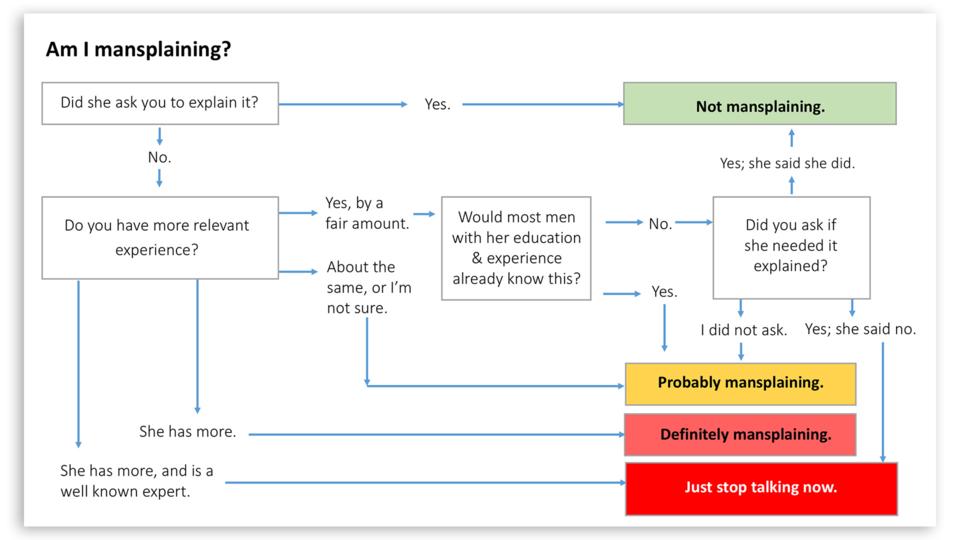
4 Common Sexist Remarks You Will Hear And How To Respond To Them
Whether you're schooling or in the workforce, chances are, you will encounter some sexist comments or questions. For most women, our automatic response is usually to ignore it or laugh it off, which just allows this sort of behaviour to continue.
On the other hand, standing up to a sexist comment can be a challenging and delicate task. This is especially the case if you're pointing it out to close colleagues and friends, a superior like your teacher or boss, or to people who have misogynistic ideals firmly ingrained in them.
Sexist remarks are often masqueraded as jokes or throwaway comments. Pointing them out as sexist will usually result in you being called oversensitive, uptight or labelled as a crazy feminist.
Read on to find out 4 common sexist remarks and how to respond to them!
#1 You should smile more
 Photo from Pinterest
Photo from Pinterest
Let's start with this infuriating one. A lot of men are genuinely flabbergasted at why this is a sexist thing to say to a woman.
Saying "No" or "Why?" will usually lead to a response like "It's just that you look prettier when you smile" or "Calm down, jeez, no need to get angry". Instead, try making firm eye contact while saying "You too, you should smile more, you look prettier when you smile" or "You give me a smile first!". Hopefully, at this point, he will understand how weird it is to be asked to smile.
Another option is to casually ask "Hmmm... would you ever ask a guy to smile more?". It's a non-confrontational way to get your point across that you're being treated differently because you're a woman.
If he's willing to hear you out, you can explain why it is a sexist statement. Try explaining that he wouldn't say this to a man because men obviously experience a wide range of emotions and will not be in the mood to smile at times. Telling men to smile more would be suggesting that they should smile even when they don't want to for the sake of looking pleasant to others, which is ridiculous. Then, end it off by asking him if he agrees that all this applies to women too.
#2 Are you on your period? or Are you PMS-ing right now?
 Photo from Pinterest
Photo from Pinterest
This is a tricky one as friends can sometimes joke with each other about PMS casually without any sexist undertone. However, in certain contexts, these statements are highly unprofessional and inappropriate.
When a woman is angry or upset, this statement may be made to imply that she is overreacting and being oversensitive or hysterical. This invalidates her feelings and suggests that women should second guess their own natural emotions.
Try throwing it back to them! Instead of answering his question, stay calm, smile, then say "Dude, I think you’re starting to get emotional. Let’s focus on the issue..." and continue the rest of the conversation. You're suggesting that he is the one overreacting to you, which may make him understand what it's like to have your anger or opinion being belittled.
#3 You're so bossy
 Photo from Pinterest
Photo from Pinterest
The recipients of this term are usually young girls who are more assertive or domineering, but notice how boys who act the same way are never referred to as "bossy". The word implies that she is overstepping her boundaries, exercising authority that she is not entitled to. A young girl who shows interest in leadership will likely be discouraged when repeatedly being criticised as "bossy".
When faced with this statement, don't deny their accusation or defend yourself or the child they are accusing. Instead, ask them "Ah, you don't like bossy girls/women?". Then, follow with an example of a great female leader you know and express your admiration for her. When a child is called bossy, you could say "Actually, I think it's great when a girl is bossy. It means she's passionate and is interested in being a leader. Instead of just calling her bossy, I think a better thing to do is to help and guide her to be a good leader to the other kids".
Another option is to embrace it and turn it to a positive statement. You could say something like "You know, you're right, she is being quite bossy. But, she's better/more knowledgable on this subject than the other kids and it will be done better if there is someone leading the group. If it takes being bossy to get the other kids to listen, then I guess she has to act that way".
#4 I'll explain it to you...
 Photo from Pinterest
Photo from Pinterest
This isn't just any plain ol' explanation, it's specifically the phenomenon of a man explaining simple things to a woman, also known as 'mansplaining'.
In the workplace, this usually takes the form of a man explaining something to a woman when she is already familiar or even an expert in the subject. This is incredibly frustrating as he automatically assumes she doesn't know something, even when he knows that men who have the same experience and educational level as her would definitely know it.
A subtle way to let him know that he is mansplaining is to ask him his opinion on a niche topic that only someone familiar with the subject will know, then proceed to tell him yours before waiting for his answer. At this point, he will realise that you already knew what he was mansplaining about in the first place.
If the mansplainers around you are your close friends and are willing to learn or correct themselves, consider sending them this hilarious yet helpful chart created by Kim Goodwin to help people tell if they were being helpful or condescending.
 Photo from BBC
Photo from BBC
A way to deal with a particularly condescending mansplainer is to use sarcasm. This will require a bit of acting skills! Give him a blank look and pretend to be completely clueless on the subject. Start asking the basic questions on the subject and give an astonished reaction to it "Whoa, I’ve never heard of that!" Take a notebook out and have your pen ready to jot notes. Hopefully, he will realise that you're being sarcastic and you can turn it into a lighthearted and humorous situation "I was just joking, silly, I'm already familiar with this!".
When it comes to standing up to sexism, it helps to build up your credibility. Try to find like-minded allies, female and male, who can support you and advocate for you. Remember, many men are just as uncomfortable with sexist statements. It may not be easy to speak up, but by addressing sexist comments directly and helping one or two people at a time understand your point of view, it helps make a difference, step by step!
Have girlfriends who have to deal with sexist comments or guy friends who may say these things but at are also cool and open to correcting themselves? Share this post with them!
Text by: GirlStyle SG





